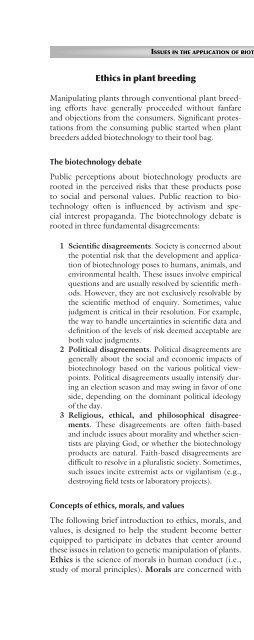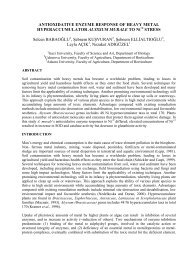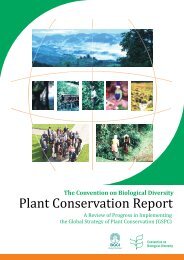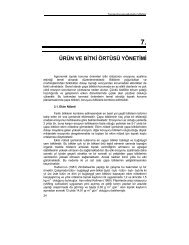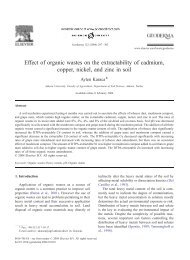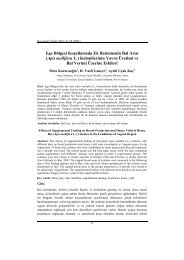Principles of Plant Genetics and Breeding
Principles of Plant Genetics and Breeding
Principles of Plant Genetics and Breeding
You also want an ePaper? Increase the reach of your titles
YUMPU automatically turns print PDFs into web optimized ePapers that Google loves.
Ethics in plant breeding<br />
Manipulating plants through conventional plant breeding<br />
efforts have generally proceeded without fanfare<br />
<strong>and</strong> objections from the consumers. Significant protestations<br />
from the consuming public started when plant<br />
breeders added biotechnology to their tool bag.<br />
The biotechnology debate<br />
Public perceptions about biotechnology products are<br />
rooted in the perceived risks that these products pose<br />
to social <strong>and</strong> personal values. Public reaction to biotechnology<br />
<strong>of</strong>ten is influenced by activism <strong>and</strong> special<br />
interest propag<strong>and</strong>a. The biotechnology debate is<br />
rooted in three fundamental disagreements:<br />
1 Scientific disagreements. Society is concerned about<br />
the potential risk that the development <strong>and</strong> application<br />
<strong>of</strong> biotechnology poses to humans, animals, <strong>and</strong><br />
environmental health. These issues involve empirical<br />
questions <strong>and</strong> are usually resolved by scientific methods.<br />
However, they are not exclusively resolvable by<br />
the scientific method <strong>of</strong> enquiry. Sometimes, value<br />
judgment is critical in their resolution. For example,<br />
the way to h<strong>and</strong>le uncertainties in scientific data <strong>and</strong><br />
definition <strong>of</strong> the levels <strong>of</strong> risk deemed acceptable are<br />
both value judgments.<br />
2 Political disagreements. Political disagreements are<br />
generally about the social <strong>and</strong> economic impacts <strong>of</strong><br />
biotechnology based on the various political viewpoints.<br />
Political disagreements usually intensify during<br />
an election season <strong>and</strong> may swing in favor <strong>of</strong> one<br />
side, depending on the dominant political ideology<br />
<strong>of</strong> the day.<br />
3 Religious, ethical, <strong>and</strong> philosophical disagreements.<br />
These disagreements are <strong>of</strong>ten faith-based<br />
<strong>and</strong> include issues about morality <strong>and</strong> whether scientists<br />
are playing God, or whether the biotechnology<br />
products are natural. Faith-based disagreements are<br />
difficult to resolve in a pluralistic society. Sometimes,<br />
such issues incite extremist acts or vigilantism (e.g.,<br />
destroying field tests or laboratory projects).<br />
Concepts <strong>of</strong> ethics, morals, <strong>and</strong> values<br />
The following brief introduction to ethics, morals, <strong>and</strong><br />
values, is designed to help the student become better<br />
equipped to participate in debates that center around<br />
these issues in relation to genetic manipulation <strong>of</strong> plants.<br />
Ethics is the science <strong>of</strong> morals in human conduct (i.e.,<br />
study <strong>of</strong> moral principles). Morals are concerned with<br />
ISSUES IN THE APPLICATION OF BIOTECHNOLOGY IN PLANT BREEDING 263<br />
the accepted rules <strong>and</strong> st<strong>and</strong>ards <strong>of</strong> human behavior in<br />
a society. They involve the concept <strong>of</strong> right or wrong, <strong>and</strong><br />
the goodness or badness <strong>of</strong> human character or behavior.<br />
Value is basically the worth attached to something.<br />
In other words, ethics is evaluative <strong>of</strong> the decisions people<br />
make <strong>and</strong> the actions they take as they are presented<br />
with dilemmas. Morality depends on values in order to<br />
determine the goodness or badness <strong>of</strong> an action. In a<br />
pluralistic society, there are differences in the sense <strong>of</strong><br />
values (i.e., relativism). Consequently, there are a variety<br />
<strong>of</strong> moral theories that do not necessarily constitute<br />
truth. Further, law, religion, <strong>and</strong> custom should be distinguished<br />
from morality. In law, lawmakers define what<br />
is right or wrong. Those who break the law are subject<br />
to punishment prescribed by the legislature. In religion,<br />
right or wrong is based on revelation or scriptural<br />
authority. Whatever choice that is made has eternal consequences.<br />
In the case <strong>of</strong> custom, tradition determines<br />
what is acceptable or not, <strong>and</strong> society expresses approval<br />
or disapproval <strong>of</strong> an action.<br />
<strong>Plant</strong> biotechnology: ethical <strong>and</strong> value issues<br />
The issues raised in this section are only a sample <strong>of</strong><br />
public opinions intended to generate discussion, not to<br />
support the author’s point <strong>of</strong> view. The issue <strong>of</strong> ethics,<br />
morals, <strong>and</strong> values in society is more important in a society<br />
in which religion is important to a significant portion<br />
<strong>of</strong> the population. Where there is a belief in God the<br />
Creator, a major source <strong>of</strong> discord in society regarding<br />
biotechnology is the notion that scientists are playing<br />
God when they fail to respect human limitations. God,<br />
humanity, <strong>and</strong> nature are linked, God being the creator<br />
<strong>of</strong> both the latter. Some people see nature as God’s<br />
creation for the benefit <strong>of</strong> humans who therefore can use<br />
plants, animals, <strong>and</strong> the ecosystem for their purposes, as<br />
they deem necessary. Others see nature as a sacred creation<br />
that must be respected <strong>and</strong> not tempered with.<br />
Does this respect mean that humans cannot manipulate<br />
nature? What cannot be denied is that the Creator has<br />
endowed humans with considerable creative genius.<br />
The obvious question then is whether exercising creativity<br />
through plant breeding <strong>and</strong> biotechnology is within<br />
the scope <strong>of</strong> this endowment or whether it is tantamount<br />
to an infringement on divine prerogative? For<br />
those who see nature as a gift to humans for their use,<br />
recombining genetic materials may be justified as just<br />
another way <strong>of</strong> using natural resources.<br />
In order for us to be correctly evaluative <strong>of</strong> our<br />
choices, decisions, <strong>and</strong> acts as they pertain to genetic<br />
manipulation, there is the need for certain basic sets <strong>of</strong>


